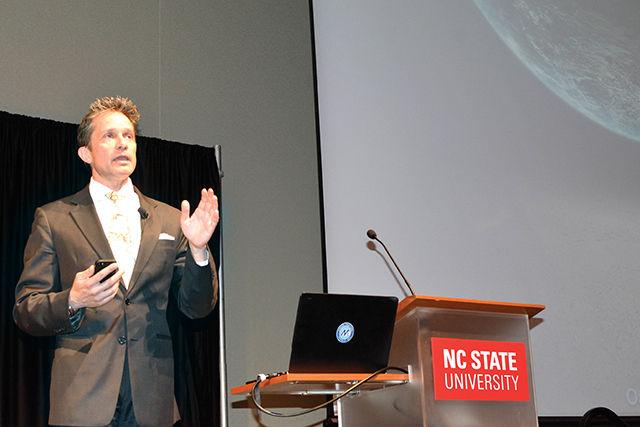Fabien Cousteau, grandson of the famous ocean explorer Jacques Cousteau and a documentary filmmaker, visited Talley Ballroom Monday afternoon to talk to more than 200 students and guests about the history and future of marine exploration.
“Marine exploration is important is because the ocean connects us all,” Cousteau said.
Changes in the nature of the ocean would change the nature of how we interact with the world, Cousteau said, and studying the ocean allows people to monitor those changes and act accordingly.
“So far we have explored less than 5 percent of the billions of cubic kilometers that make up the ocean,” Cousteau said.
Misinformation surrounding marine animals contributes to the widespread destruction of marine ecosystems, which prompted Cousteau to make correcting some of those misconceptions one of his top priorities.
“As it stands we have lost over 90 percent of certain species of fish such as sharks,” Cousteau said.
Cousteau turned to documentary filmmaking to help solve the problem of how to best educate the public about the harm that misconceptions play in the survival of critical marine species.
Cousteau made one of his first documentaries in 2006, a documentary/reality television show called “Shark: Mind of a Demon.” The documentary detailed a new way to study sharks, a species that previously had only been observed in tanks or with intrusive visits to the wild.
The scientists in the program used an animatronic shark submarine to study sharks in their natural habitats while at the same time avoiding any intrusive behavior.
In one of Cousteau’s more recent projects called Mission 31, he and a team of scientists lived in the underwater laboratory Aquarius for 31 days.
“The amazing thing about living at that depth is that your body will eventually acclimate, so at three atmospheric pressures we were able to dive for almost eight hours each day,” Cousteau said.
Cousteau said he had the opportunity to become an aquanaut, essentially an underwater astronaut, and live underwater with a team of scientists to observe the ocean in a way no one previously had been able to.
One of the reasons this research was so unique was because it gave researchers the chance to live and work while saturated.
“Our saturation allowed us to approach animals in ways we had never been able to before,” Cousteau said. “We did three years of research in 31 days.”
Saturation is a biological process that refers to the ratio of essential able to be absorbed into tissue at a specific depth. Saturation creates certain psychological phenomenon which can change people’s sense of humor or decision-making skills.
According to Cousteau, sometimes aquanauts will find a joke extremely funny that people on the surface can’t even understand.
One of the unusual observations the researchers made involved how the animals reacted to their presence underwater. Eagle rays, a normally transient species, decided to stay with the researchers for the full 31 days, Cousteau said.
Cousteau said a drawback of saturation research was the required depressurization period the researchers had to go through in order to surface again.
If a person were to surface without depressurizing the body, they would experience a phenomenon often referred to as the bends, which, in extreme cases, can result in paralysis and death. For the members of Mission 31, it took a little more than 22 hours to desaturate.
Cousteau credits his family with inspiring him to do the necessary research he does today.
Jacques Cousteau, Fabien Cousteau’s grandfather, was one of the foremost marine explorers of his time. Jacques Cousteau occupied a major position in the history of marine exploration due to his role in the creation of much of the technology marine explorers use today, including the Aqua-Lung and underwater labs.
Fabien Cousteau’s family marine experience extends beyond the work of his grandfather. His grandmother is credited with being the world’s first female aquanaut.
Benjamin Wise, a sophomore studying biology, said Cousteau’s research is important because we lack knowledge about the vast amount of the world’s oceans.
“There is so much of our world we haven’t explored that may become necessary as global population density increases,” Wise said.
Cousteau encouraged guests to be a part of a voice for a better future.
“It’s about creating not just a better future, but a more viable future for us and our children,” Cousteau said.








